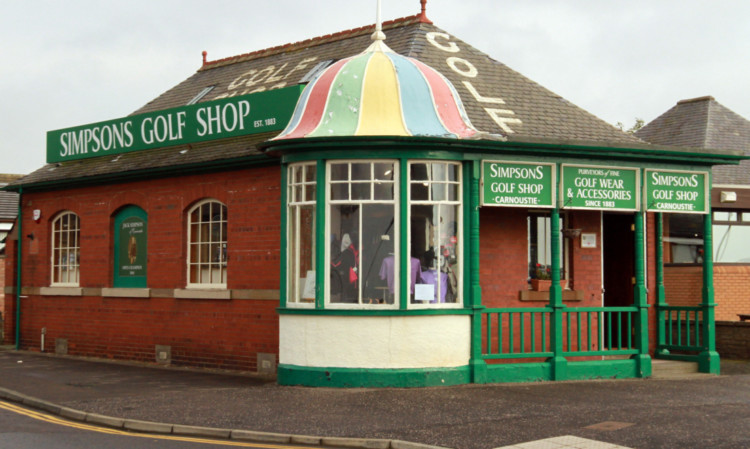An iconic Angus golf shop, believed to be the world’s second oldest, is under new ownership.
With its distinctive multi-coloured umbrella tower, Simpsons has stood on Links Parade since being founded by unsung Scots golfing legend Robert Simpson in 1883.
The premises are a short chip away from Carnoustie’s Championship Course, which Simpson helped old Tom Morris redesign.
The shop’s new owners hope to use the premise’s rich history to bring fresh international attention to Carnoustie and Angus.
The shop, which was on the market for £250,000, has been bought by Margaret and David Valentine, the Forfar-based joint owners of Valentine International Business Connections LLP.
Through his former role as Angus Council’s economic development chief, Mr Valentine was instrumental in forging the county’s now well-established links with China one of the main areas of international focus for the new venture.
Speaking exclusively to The Courier, he said: “Our decision to buy the shop was because of our interest in developing the Simpsons brand.
“Few visitors to Carnoustie know much, if anything, about Robert Simpson and the fabulous contribution the Simpson family made to the world of golf in the early 20th century. We will start by telling the story of Simpsons in China where I have extensive golf industry and media connections,” said Mr Valentine.
“This year is the 30th anniversary of golf in China and my intention is to co-produce a Simpsons book with a Chinese golf writer and at the same time introduce hickory golf tournaments as a marketing platform for Simpsons branded heritage products.”
He added: “Frankly, if we hadn’t stepped in and bought the shop it would most likely have closed and this would have been a disaster for Carnoustie’s golf heritage, the employees and everyone concerned.”
The shop’s three staff are being retained at the premises, which last year was hit by thieves in a £3,000 clothing raid.
Mrs Valentine said: “Hopefully our shop will become a stepping stone to what is on offer from the other shops and facilities in the town and we will encourage golfers and their families to explore what’s on in and around Carnoustie Country.”
Mr Valentine added: “2014 should be a great year for tourism in Scotland, with key events taking place including the Commonwealth Games, the Ryder Cup and the Gathering. As well as these we have our established events like the Tassie and Dunhill Cup. Hopefully all of these will encourage more visitors to the town.”
ROBERT SIMPSON
Robert Simpson was born in 1862, the fifth of six golfing brothers from Earlsferry in the East Neuk of Fife.
By the 1920s the family name was synonymous with success in the sport of golf, Jack won the Open Championship in 1884 and his brothers Robert and Archie came close to lifting the Claret Jug.
Archie helped Robert design the world famous Royal Aberdeen course before going on to make a name for himself across the Atlantic.
But Robert remained true to his Scottish roots, forging himself an international reputation as a club-maker, ball-maker, course designer, tutor and playing professional.
He also assisted old Tom Morris in the redesign of the Carnoustie Championship Course, which today stands as a globally recognised challenge just yards from the famous shop he founded on the corner of Links Parade in 1883.
Robert died in 1923.
His grandson, Trevor Williamson, was the last member of the family to manufacture the famous hickory clubs developed by his forebear and the workbench he used in the 1980s remains in the shop today.
